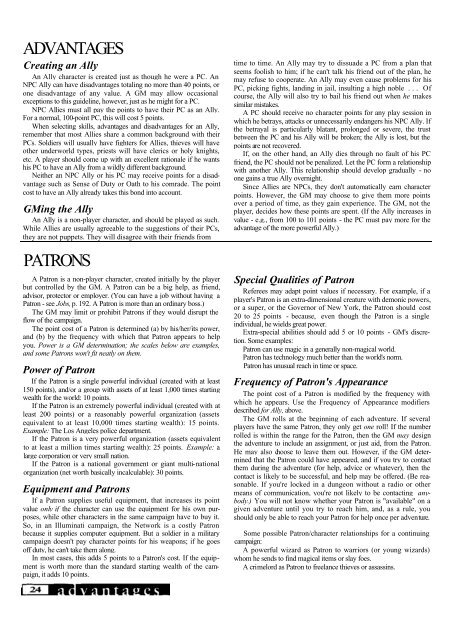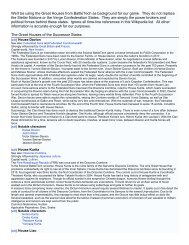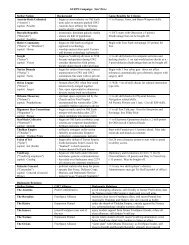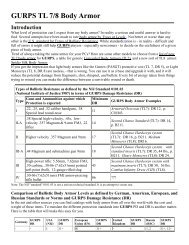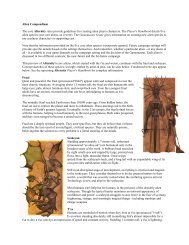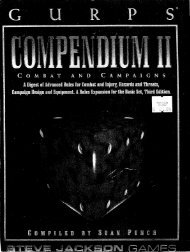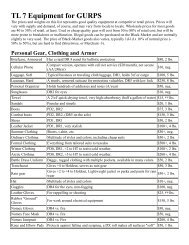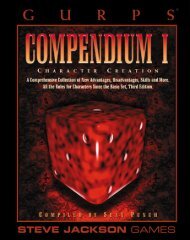Rapid Healing5 pointsThis advantage is only available if your basic HT is 10 or above.You recover rapidly from all kinds of wounds. Whenever you roll torecover lost HT, or when you roll to see if you can get over acrippling injury, add 5 to your effective HT. This ability does nothelp you get over being stunned, etc.ReputationA good reputation counts as an advantage. See p. 17.StatusHigh social status is an advantage. See p. 18.Strong WillVariable4 points/levelYou have much more "willpower" than the average person.Your level of Will is added to your IQ when you make a Will Rollfor any reason, including any attempt to affect you by Diplomacy,Fast-Talk, Sex Appeal, Interrogation (with or without torture),Hypnotism, or psionic or magical attempts to take over your mind.Strong Will adds to your resistance when you want to resist a magicspell (p. 150). However, this advantage does not help against combatshock, and so on. In questionable cases, the GM's ruling is law.Example: You have 3 levels of Strong Will. An enemy spy istrying to seduce you. The GM rolls a Contest of Skills: the spy'sSex Appeal vs. your IQ. But you have a +3 in the contest, because ofyour willpower.Cost: 4 points per +1 bonus.ToughnessVariable10/25 pointsYour skin and flesh are tougher than the average human's. Yourbody itself has a Damage Resistance score. This DR is treated justlike the DR from armor: you subtract it from the damage done byany blow, before you multiply the damage done by a cutting orimpaling weapon. Toughness does not make you any harder to hit -it just lets you survive more injury.Toughness does not let your skin "turn" weapons. They stillbreak the skin - they may even draw blood. But you're not hurt.Many fictional heroes have partners - loyal comrades, faithfulsidekicks or life-long friends - who accomp any them on adventures.These partners are Allies. Having an Ally is an advantage.In one sense, the other PCs who adventure with you are allies.But they can be unreliable allies indeed. Often they are chanceacquaintances, first encountered at a roadside tavern only hoursago. They have their own hidden goals, ethics and motives, whichmay or may not coincide with your own.An NPC Ally, on the other hand, is wholly reliable. Perhaps youfought side-by-side in an extended campaign, trained under thesame master, or grew up in the same village. The two of you trusteach other implicitly. You travel together, fight back-to-back, sharerations in hard times, trade watches through the night.The point cost for an Ally is determined by his point value andfrequency of appearance.Ally's PowerAn Ally built on 75 or fewer points is actually a Dependent (see p.38).ADVANTAGESHowever, if a poisoned weapon breaks your skin, the poison will doits normal damage. Note also that your eyes are not tough! A hitthere will do normal damage.Cost: 10 points for DR 1, or 25 points for DR 2. Higher bodilyDRs are not possible to a "natural" human. But some creatures havenatural Toughness, or even natural armor that can stop weapons.Unusual Background10 or more pointsThis is a "catch-all" advantage that can be used whenever it isneeded. For instance, if your parents were traveling merchants, youcould reasonably claim to have two or three "native" languages.But that is clearly an unusual background, which costs points.Similarly, if you have access to skills not available to the peoplearound you, that is Unusual. In general, any time a player comes upwith a "character story" that would reasonably give him some specialbenefit, the GM should allow this, but require UnusualBackground to cover it.The GM may charge extra points if he rules the background isvery unusual. "Raised by aliens" or "trained from birth by a mysteriousninja cult" might be considered "very unusual" in most gameworlds.Psi-users, supers or wizards are Very Unusual if theyappear in a game world where their special talents are unique.Voice10 pointsYou have a naturally clear, resonant and attractive voice. Youget a permanent +2 bonus on all the following skills: Bard,Diplomacy, Performance, Politician, Savoir-Faire, Sex Appeal andSinging. You also get a +2 on any reaction roll made by someonewho can hear your voice.WealthVariableWealth can be a truly wonderful advantage. See p. 16 for thepoint cost for different levels of wealth. Remember that wealth isrelative, and determined by the game world you start in. The precisemeaning of each level will be defined, for each game world, inthat world's book.ALLIESAn Ally built on 76 to 100 points costs 5 points.An Ally built on 101 to 150 points costs 10 points.An Ally built on 151 to 200 points costs 15 points, etc.An Ally built on over 50 points more than his PC is actually aPatron (p. 24).An Ally having special abilities - magic powers in a non-magicalworld, equipment far beyond the world's TL - costs an extra 5 to 10points, at the GM's discretion.Frequency of AppearanceTo determine whether your Ally appears in a given play session,the GM rolls 3 dice. If the number rolled is within the range for theally (see below), then the ally will be with you for that adventure.Ally appears almost all the time (roll of 15 or less): triplecost.Ally appears quite often (roll of 12 or less): double cost.Ally appears fairly often (roll of 9 or less): listed cost.Ally appears rarely (roll of 6 or less): half cost (round up).
ADVANTAGESCreating an AllyAn Ally character is created just as though he were a PC. AnNPC Ally can have disadvantages totaling no more than 40 points, orone disadvantage of any value. A GM may allow occasionalexceptions to this guideline, however, just as he might for a PC.NPC Allies must all pay the points to have their PC as an Ally.For a normal, 100-point PC, this will cost 5 points.When selecting skills, advantages and disadvantages for an Ally,remember that most Allies share a common background with theirPCs. Soldiers will usually have fighters for Allies, thieves will haveother underworld types, priests will have clerics or holy knights,etc. A player should come up with an excellent rationale if he wantshis PC to have an Ally from a wildly different background.Neither an NPC Ally or his PC may receive points for a disadvantagesuch as Sense of Duty or Oath to his comrade. The pointcost to have an Ally already takes this bond into account.GMing the AllyAn Ally is a non-player character, and should be played as such.While Allies are usually agreeable to the suggestions of their PCs,they are not puppets. They will disagree with their friends fromPATRONSA Patron is a non-player character, created initially by the playerbut controlled by the GM. A Patron can be a big help, as friend,advisor, protector or employer. (You can have a job without having aPatron - see Jobs, p. 192. A Patron is more than an ordinary boss.)The GM may limit or prohibit Patrons if they would disrupt theflow of the campaign.The point cost of a Patron is determined (a) by his/her/its power,and (b) by the frequency with which that Patron appears to helpyou. Power is a GM determination; the scales below are examples,and some Patrons won't fit neatly on them.Power of PatronIf the Patron is a single powerful individual (created with at least150 points), and/or a group with assets of at least 1,000 times startingwealth for the world: 10 points.If the Patron is an extremely powerful individual (created with atleast 200 points) or a reasonably powerful organization (assetsequivalent to at least 10,000 times starting wealth): 15 points.Example: The Los Angeles police department.If the Patron is a very powerful organization (assets equivalentto at least a million times starting wealth): 25 points. Example: alarge corporation or very small nation.If the Patron is a national government or giant multi-nationalorganization (net worth basically incalculable): 30 points.Equipment and PatronsIf a Patron supplies useful equipment, that increases its pointvalue only if the character can use the equipment for his own purposes,while other characters in the same campaign have to buy it.So, in an Illuminati campaign, the Network is a costly Patronbecause it supplies computer equipment. But a soldier in a militarycampaign doesn't pay character points for his weapons; if he goesoff duty, he can't take them along.In most cases, this adds 5 points to a Patron's cost. If the equipmentis worth more than the standard starting wealth of the campaign,it adds 10 points.time to time. An Ally may try to dissuade a PC from a plan thatseems foolish to him; if he can't talk his friend out of the plan, hemay refuse to cooperate. An Ally may even cause problems for hisPC, picking fights, landing in jail, insulting a high noble ... Ofcourse, the Ally will also try to bail his friend out when he makessimilar mistakes.A PC should receive no character points for any play session inwhich he betrays, attacks or unnecessarily endangers his NPC Ally. Ifthe betrayal is particularly blatant, prolonged or severe, the trustbetween the PC and his Ally will be broken; the Ally is lost, but thepoints are not recovered.If, on the other hand, an Ally dies through no fault of his PCfriend, the PC should not be penalized. Let the PC form a relationshipwith another Ally. This relationship should develop gradually - noone gains a true Ally overnight.Since Allies are NPCs, they don't automatically earn characterpoints. However, the GM may choose to give them more pointsover a period of time, as they gain experience. The GM, not theplayer, decides how these points are spent. (If the Ally increases invalue - e.g., from 100 to 101 points - the PC must pay more for theadvantage of the more powerful Ally.)Special Qualities of PatronReferees may adapt point values if necessary. For example, if aplayer's Patron is an extra-dimensional creature with demonic powers,or a super, or the Governor of New York, the Patron should cost20 to 25 points - because, even though the Patron is a singleindividual, he wields great power.Extra-special abilities should add 5 or 10 points - GM's discretion.Some examples:Patron can use magic in a generally non-magical world.Patron has technology much better than the world's norm.Patron has unusual reach in time or space.Frequency of Patron's AppearanceThe point cost of a Patron is modified by the frequency withwhich he appears. Use the Frequency of Appearance modifiersdescribed for Ally, above.The GM rolls at the beginning of each adventure. If severalplayers have the same Patron, they only get one roll! If the numberrolled is within the range for the Patron, then the GM may designthe adventure to include an assignment, or just aid, from the Patron.He may also choose to leave them out. However, if the GM determinedthat the Patron could have appeared, and if you try to contactthem during the adventure (for help, advice or whatever), then thecontact is likely to be successful, and help may be offered. (Be reasonable.If you're locked in a dungeon without a radio or othermeans of communication, you're not likely to be contacting anybody.)You will not know whether your Patron is "available" on agiven adventure until you try to reach him, and, as a rule, youshould only be able to reach your Patron for help once per adventure.Some possible Patron/character relationships for a continuingcampaign:A powerful wizard as Patron to warriors (or young wizards)whom he sends to find magical items or slay foes.A crimelord as Patron to freelance thieves or assassins.
- Page 3 and 4: 17. FLIGHT.........................
- Page 5 and 6: Materials Needed for PlayThe GURPS
- Page 7 and 8: WHAT IS ROLEPLAYING?A roleplaying g
- Page 9 and 10: Character TypesThere are no "charac
- Page 12 and 13: Four numbers called "attributes" ar
- Page 14 and 15: You are free to set the physical ap
- Page 16 and 17: REPUTATIONSome characters are so we
- Page 18 and 19: These are character traits that are
- Page 20 and 21: Legal Enforcement Powers 5, 10 or 1
- Page 24 and 25: A minor deity as Patron to a travel
- Page 26 and 27: ReputationVariable (see p. 17)Socia
- Page 28 and 29: Lame-15,-25, or -35 pointsYou have
- Page 30 and 31: Bad Temper-10 pointsYou are not in
- Page 32 and 33: Dyslexia-5 or -15 pointsYou have a
- Page 34 and 35: Pacifism-15 or -30 pointsYou are op
- Page 36 and 37: Shyness-5,-10,-15 pointsYou are unc
- Page 38 and 39: You have a significant responsibili
- Page 40 and 41: A "quirk" is a minor personality tr
- Page 42 and 43: SpecializingRequired Specialization
- Page 44 and 45: MEANING OF SKILL LEVELSSo you have
- Page 46 and 47: Teamster (Mental/Average)Defaults t
- Page 48 and 49: Skiing (Physical/Hard)Defaults to D
- Page 50 and 51: Guns/TL (Physical/Easy)Defaults to
- Page 52 and 53: Any of these skills can be self-tau
- Page 54 and 55: Levels of Language SkillThis table
- Page 56 and 57: Most outdoor skills can be learned
- Page 58 and 59: PSIONIC SKILLSThese are special men
- Page 60 and 61: Forensics/TL (Mental/Hard)Defaults
- Page 62 and 63: Few Hundred Acres: Knowledge of far
- Page 64 and 65: Many skills in this category are ta
- Page 66 and 67: Lockpicking/TL (Mental/Average) Def
- Page 68 and 69: Gunner/TL See Combat Skills, p. 50M
- Page 70 and 71: Now you need to decide what equipme
- Page 72 and 73:
Each suit of "real" armor includes
- Page 74 and 75:
Listing Weapons On Your Character S
- Page 76 and 77:
Recording Encumbrance on YourCharac
- Page 78 and 79:
Passive Defense. The first blank is
- Page 80 and 81:
The longer (and the more skillfully
- Page 82 and 83:
When you improve a skill, the cost
- Page 84 and 85:
Not all the advantages and disadvan
- Page 86 and 87:
But remember . . . some skills have
- Page 88 and 89:
ClimbingTo climb anything more diff
- Page 90 and 91:
SwimmingThe Swimming skill (p. 49)
- Page 92 and 93:
WILL ROLLSWhen a character is faced
- Page 94 and 95:
The GURPS combat system is designed
- Page 96 and 97:
WaitDo nothing unless a foe comes w
- Page 98 and 99:
You may only block one attack per t
- Page 100 and 101:
Missile WeaponsMissile weapons are
- Page 102 and 103:
At the end of your move, if you hav
- Page 104 and 105:
The rules for attacking a foe are e
- Page 106 and 107:
tell you how long it will take. In
- Page 108 and 109:
You may normally parry only one att
- Page 110 and 111:
CLOSE COMBATUsing the Move, Step an
- Page 112 and 113:
(adjusted) ST! Note that a shield h
- Page 114 and 115:
Ranged Weapon StatsFor each ranged
- Page 116 and 117:
second. On the table, this rounds u
- Page 118 and 119:
If you are using the "hit location"
- Page 120 and 121:
Removing or folding the stock of a
- Page 122 and 123:
After the initial "freeze" ends, ea
- Page 124 and 125:
ATTACKING INANIMATE OBJECTSThere ar
- Page 126 and 127:
This subtraction will mostoften aff
- Page 128 and 129:
Psionic healing (p. 175) and magica
- Page 130 and 131:
DrowningSee the rules for Swimming,
- Page 132 and 133:
protects completely. Toughness prot
- Page 134 and 135:
Resolving mounted or vehicular comb
- Page 136 and 137:
Using Ranged Weapons From Horseback
- Page 138 and 139:
This section covers special rules f
- Page 140 and 141:
HT: Health and Hit PointsFor a roug
- Page 142 and 143:
Swarm AttacksA group of small creat
- Page 144 and 145:
Encumbrance and MovementEncumbrance
- Page 146 and 147:
A critical miss means the energy co
- Page 148 and 149:
oll will not end the spell, but the
- Page 150 and 151:
If the subject makes the resistance
- Page 152 and 153:
won't work. If anyone but the caste
- Page 154 and 155:
ANIMAL SPELLSThese are the spells r
- Page 156 and 157:
If the summoning spell is repeated,
- Page 158 and 159:
Cost: 1 for an object up to the siz
- Page 160 and 161:
Armor EnchantmentsThese spells work
- Page 162 and 163:
AuraInformationShows the caster a g
- Page 164 and 165:
Psionics, or "psi" abilities, are p
- Page 167 and 168:
GlossaryESP - Extra-Sensory Percept
- Page 169 and 170:
Psionics and MagicMagic and psionic
- Page 171 and 172:
PSYCHOKINESISThis power covers movi
- Page 173 and 174:
Pside EffectsPsi skills can have "s
- Page 175 and 176:
Limitations(Continued)Fickle: varia
- Page 177 and 178:
Player-Made MapsWhenever the player
- Page 179 and 180:
Predetermined ReactionsCertain NPCs
- Page 181 and 182:
Dealing with the PlayersArgumentsAs
- Page 183 and 184:
Time Use SheetsThe Time Use Sheet (
- Page 185 and 186:
Weapons and Armor0. Fists and stone
- Page 187 and 188:
Weather(Continued)WindWinds from ga
- Page 189 and 190:
Gold and SilverA traditional assump
- Page 191 and 192:
JobsThe jobs available in each game
- Page 193 and 194:
Job (Prerequisites), Monthly Income
- Page 195 and 196:
Sooner or later, every GM wants to
- Page 197 and 198:
Features of a GoodAdventureA good a
- Page 199 and 200:
World-BuildingA game world is a com
- Page 201 and 202:
CRITICAL HIT TABLEAll doublings or
- Page 203 and 204:
When the players meet an NPC whose
- Page 205 and 206:
Weapons are listed in groups, accor
- Page 207 and 208:
MODERN AND ULTRA-TECH WEAPONSWeapon
- Page 209 and 210:
ANCIENT/MEDIEVAL ARMORUse this tabl
- Page 211 and 212:
FANTASY/MEDIEVAL EQUIPMENTThe follo
- Page 231 and 232:
After eight printings of the GURPS
- Page 233 and 234:
of Divination should match the "fla
- Page 235 and 236:
Minor disadvantage: -5 points. Agai
- Page 237 and 238:
Whether through an accident of birt
- Page 239 and 240:
Note that this disadvantage is inco
- Page 241 and 242:
SKILLSARTISTIC SKILLSVideo Producti
- Page 243 and 244:
traders, and chess-like games are c
- Page 245 and 246:
If, during an adventure, a philosop
- Page 247 and 248:
VITAL ORGANSThese are optional rule
- Page 256 and 257:
INSTANT CHARACTERSThis quick refere


